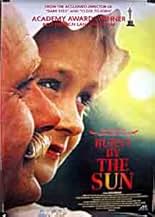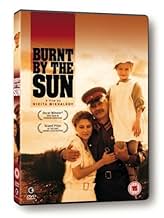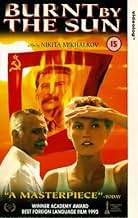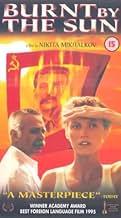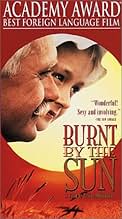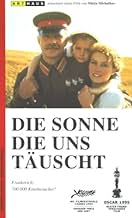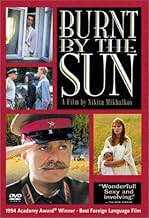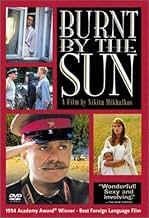CALIFICACIÓN DE IMDb
7.8/10
17 k
TU CALIFICACIÓN
Agrega una trama en tu idiomaIn the USSR in 1936, shadows of Stalin's repressions fall on a famous, revolutionary hero. The accusations of him being a foreign spy are nonsense, and everyone knows that. However, a slow p... Leer todoIn the USSR in 1936, shadows of Stalin's repressions fall on a famous, revolutionary hero. The accusations of him being a foreign spy are nonsense, and everyone knows that. However, a slow process of his downfall has already started.In the USSR in 1936, shadows of Stalin's repressions fall on a famous, revolutionary hero. The accusations of him being a foreign spy are nonsense, and everyone knows that. However, a slow process of his downfall has already started.
- Dirección
- Guionistas
- Elenco
- Ganó 1 premio Óscar
- 4 premios ganados y 9 nominaciones en total
Ingeborga Dapkunaite
- Marusya
- (as Ingeborga Dapkunayte)
Nadezhda Mikhalkova
- Nadya
- (as Nadya Mikhalkova)
André Oumansky
- Filipp
- (as Andre Umanskiy)
Opiniones destacadas
Despite its dark subject matter, this is a very positive and heart warming movie. It shows Stalinism without the Western propaganda, through the lens of great Soviet people that made everything good even under Stalin possible. An ode of love to the great Russian and Soviet nation. Definitely recommended.
I just watched and loved this movie.
It originally portrays the contrast in character, personality, viewpoint, and the relative consequences of the Revolution upon two people -
a) Mitya, a handsome, charming, romantic, poetic, musical, child-loving man who before the movie began, lived in rural Russia, grew up with a girl who was 7 when he was conscripted into World War I, and deeply loved her parents, cousins, aunts, uncles and the household servants, and
b) Kotov, an older man, military, probably more courageous and less intelligent, bluff and physical, sentimental and less artistic, stronger but simpler, equally child-loving, from a poorer background.
Enemies in the Revolution, their behavior toward each other begins with cruelty by Kotov toward Mitya, Mitya's forced cruelty to others, and a changed and cruel man now (and knowing it) Mitya's cruelty to Kotov. And yes, a woman is also in the mix. The story is told as much through Kotov's eyes as through Mitya's.
And guess what? With all this cruelty, Kotov and Mitya are both people you'd love to spend the day with.
It's beautifully photographed - the same wonderful languor as watching say, Turgenev's A Month in the Country, the child is enchanting, the story is absolutely fascinating - far more original than such other "political" movies as The Conformist or The Garden of the Finzi-Continis. The movie is about social class, temperament, and how freely people make decisions in their lives, about love for the opposite sex, children, and country. It's compelling - you will truly always remember this movie.
It originally portrays the contrast in character, personality, viewpoint, and the relative consequences of the Revolution upon two people -
a) Mitya, a handsome, charming, romantic, poetic, musical, child-loving man who before the movie began, lived in rural Russia, grew up with a girl who was 7 when he was conscripted into World War I, and deeply loved her parents, cousins, aunts, uncles and the household servants, and
b) Kotov, an older man, military, probably more courageous and less intelligent, bluff and physical, sentimental and less artistic, stronger but simpler, equally child-loving, from a poorer background.
Enemies in the Revolution, their behavior toward each other begins with cruelty by Kotov toward Mitya, Mitya's forced cruelty to others, and a changed and cruel man now (and knowing it) Mitya's cruelty to Kotov. And yes, a woman is also in the mix. The story is told as much through Kotov's eyes as through Mitya's.
And guess what? With all this cruelty, Kotov and Mitya are both people you'd love to spend the day with.
It's beautifully photographed - the same wonderful languor as watching say, Turgenev's A Month in the Country, the child is enchanting, the story is absolutely fascinating - far more original than such other "political" movies as The Conformist or The Garden of the Finzi-Continis. The movie is about social class, temperament, and how freely people make decisions in their lives, about love for the opposite sex, children, and country. It's compelling - you will truly always remember this movie.
"Burnt by the Sun" is a powerful example of what a genuinely Russian movie can be when it uses the good sides of western film-making : a coherent plot, professional camera work, and freedom of expression, all things that were rare for the cinema of Soviet times. Of course, it is not surprising that it was made by Nikita Mikhalkov, one of the few Russian directors who achieved lasting world success during communism, and therefore he had the right contacts abroad to get a decent budget. Though, "Burnt by the Sun" is way better than Mikhalkov's pompous "Barber of Siberia", which was alloted more money than any other film in the history of Russian cinema.
In "Burnt by the Sun", Mikhalkov was able to give us a palpable feeling of the beauty and genius of Russia. The lighting is magnificent all the way through, and the ripe and wide wheat fields shine like gold. The action takes place in a cozy dacha among the birch trees, a house which seems to be the nest of a bunch of gentle and carefree eccentrics, all in an atmosphere that reminds pleasantly of Tchekov.
Yet, you can tell from the start that "Burnt by the Sun" is not going to be just a comedy, as the first scene opens on a man cutting his veins in a bathtub while the telephone is ringing. However, this first forewarning soon gets forgotten throughout most of the film, which keeps a warm, light-hearted, slightly nostalgic tone almost all the time. It is only towards the middle you realize that it starts looming slowly towards predictable tragedy, and this only gets obvious in the very last moments.
It turns out that the characters we see are all members of an old aristocratic family who were spared the horrors of the revolution because the younger daughter, Marusia, married a Red Army colonel, much older than she is. Thus, they keep on living as they ever did, playing cards, drinking tea from samovars, making private jokes in French. They even have a maid and a parrot. They seem totally oblivious of the reality around them. Except for innocent looking balloons with Stalin's face on them and a few parading pioneers, the communist regime is visible almost only through the presence of colonel Kotov, brilliantly played here by Nikita Mikhalkov himself.
Colonel Kotov impersonates a character very familiar to the Russian mentality : he is tall, strong, authoritarian, but at the same time protective, warm-hearted, charming and prone to jokes. He is about just as sympathetic as the gruff milkman with a heart of gold in "Fiddler on the Roof". Although he is a military, he is not the kind of guy you think as having blood on his hands. But of course Lenin and Stalin's aura over Russian people was also partly due to the fact that they represented strong and protective father figures.
The story takes a sudden turn with the arrival of an enigmatic character disguised as a Santa Claus in the middle of summer. He turns out to be known by everyone in the house, as he is the adoptive child of the late grandfather. In fact, he was Marusia's childhood companion, and her lover in the first place, but was evicted by Kotov, who protected henceforth the whole family from repression. It soon becomes clear that the man, called Mitya, has come to take revenge for his shattered life.
All performances here are good, even though Nikita Mikhalkov, as an actor, still manages to steal the show. But one will not either forget the performance of his then six-year old daughter Nadya , who also plays his daughter in the movie. A charming, energetic and witty child performance which impersonates the innocence of the family about to be lost.
The French title for the movie was "Deceitful Sun", and I find it more appropriate. Although the film bathes in quiet sunlight, it deals with one of the darkest eras of Russian/Soviet history : Stalinism. In the early 1930's, Stalin decided to eliminate much of the newly arisen communist elite whom he did not trust anymore, and hired former enemies of communism, or half-criminals, to eradicate his own official allies. Thus, colonel Kotov remains self-righteous and sure of himself almost until the end because he simply cannot believe that Stalin will not protect him.
Needless to say that "Burnt by the Sun" is one of the first Russian movies that deals so openly with the subject. A subject which still remains quite sensitive since millions of people had their lives shattered by those events. Unlike what happened for Nazism, it was not until the end of the communist regime that it was possible to discuss it openly, even though Stalin's deeds had already been condemned officially a long time before. Therefore, this superb drama is also the symbol of a historical breakthrough.
In "Burnt by the Sun", Mikhalkov was able to give us a palpable feeling of the beauty and genius of Russia. The lighting is magnificent all the way through, and the ripe and wide wheat fields shine like gold. The action takes place in a cozy dacha among the birch trees, a house which seems to be the nest of a bunch of gentle and carefree eccentrics, all in an atmosphere that reminds pleasantly of Tchekov.
Yet, you can tell from the start that "Burnt by the Sun" is not going to be just a comedy, as the first scene opens on a man cutting his veins in a bathtub while the telephone is ringing. However, this first forewarning soon gets forgotten throughout most of the film, which keeps a warm, light-hearted, slightly nostalgic tone almost all the time. It is only towards the middle you realize that it starts looming slowly towards predictable tragedy, and this only gets obvious in the very last moments.
It turns out that the characters we see are all members of an old aristocratic family who were spared the horrors of the revolution because the younger daughter, Marusia, married a Red Army colonel, much older than she is. Thus, they keep on living as they ever did, playing cards, drinking tea from samovars, making private jokes in French. They even have a maid and a parrot. They seem totally oblivious of the reality around them. Except for innocent looking balloons with Stalin's face on them and a few parading pioneers, the communist regime is visible almost only through the presence of colonel Kotov, brilliantly played here by Nikita Mikhalkov himself.
Colonel Kotov impersonates a character very familiar to the Russian mentality : he is tall, strong, authoritarian, but at the same time protective, warm-hearted, charming and prone to jokes. He is about just as sympathetic as the gruff milkman with a heart of gold in "Fiddler on the Roof". Although he is a military, he is not the kind of guy you think as having blood on his hands. But of course Lenin and Stalin's aura over Russian people was also partly due to the fact that they represented strong and protective father figures.
The story takes a sudden turn with the arrival of an enigmatic character disguised as a Santa Claus in the middle of summer. He turns out to be known by everyone in the house, as he is the adoptive child of the late grandfather. In fact, he was Marusia's childhood companion, and her lover in the first place, but was evicted by Kotov, who protected henceforth the whole family from repression. It soon becomes clear that the man, called Mitya, has come to take revenge for his shattered life.
All performances here are good, even though Nikita Mikhalkov, as an actor, still manages to steal the show. But one will not either forget the performance of his then six-year old daughter Nadya , who also plays his daughter in the movie. A charming, energetic and witty child performance which impersonates the innocence of the family about to be lost.
The French title for the movie was "Deceitful Sun", and I find it more appropriate. Although the film bathes in quiet sunlight, it deals with one of the darkest eras of Russian/Soviet history : Stalinism. In the early 1930's, Stalin decided to eliminate much of the newly arisen communist elite whom he did not trust anymore, and hired former enemies of communism, or half-criminals, to eradicate his own official allies. Thus, colonel Kotov remains self-righteous and sure of himself almost until the end because he simply cannot believe that Stalin will not protect him.
Needless to say that "Burnt by the Sun" is one of the first Russian movies that deals so openly with the subject. A subject which still remains quite sensitive since millions of people had their lives shattered by those events. Unlike what happened for Nazism, it was not until the end of the communist regime that it was possible to discuss it openly, even though Stalin's deeds had already been condemned officially a long time before. Therefore, this superb drama is also the symbol of a historical breakthrough.
9=G=
"Burnt by the Sun" glides effortlessly, seamlessly though the genres as it tells of a handful of Russian characters who collectively constitute a family of sorts with great humor and drama, poignant and sweetly sentimental moments, and excellence both technically and artistically. What is more, the film's story is interesting, unpredictable, and well told with depth and thoroughly developed characters.
The much which has been written about the politics of the our time, the Oscar award and the bravura with which it was accepted, etc. is much ado about nothing. This is a movie. This is art and entertainment. And, when taken for what it is, "Burnt by the Sun" is truly a masterpiece.
The much which has been written about the politics of the our time, the Oscar award and the bravura with which it was accepted, etc. is much ado about nothing. This is a movie. This is art and entertainment. And, when taken for what it is, "Burnt by the Sun" is truly a masterpiece.
Having read all of the negative commentaries on this film, I would first like to point out that severely criticising the period of Soviet history in which Utoml'ennye Solntsem takes place, and in that effort, condemning the people of that era such as are portrayed in this film as being entirely culpable for their actions, is all very well and good to do from hindsight, and from the safety of a soft computer chair in the modern-day West. Because of course, no one is tortured today in the West for a casual remark against the reigning despot; nor do we live under the threat that our families may be sent off to Siberia as one of the consequences of our actions, great or trivial. I myself can't say what I would have been willing to do under the circumstances that existed during the time of the Soviet purges, whom I would have betrayed just to survive, or if I would have the courage to make some kind of moral, social, or political stand, and if I think I could have? Well,if we all admit it to ourselves, we know that torture will break any man eventually... In watching this film, I think that we should keep in mind that we are not necessarily here to judge but to take the director's journey to another time and place: and yet we should still be able to remember and respect the fact that what we are seeing here is a piece of the history that lies beneath the modern day Russia. This history is a shadow that has cast its pall over the lives of every Soviet citizen since then, including Mikhalkov. The fear of the purges that swept over the Soviet Union during the 1930's and 40's is a kind of fear that will fade, but never die away entirely. So, what can be the point in overly criticising Mikhalkov or any one in the former USSR for surviving under the system as it was before glasnost, knowing what they knew of the state and the full extent of what it could do and had already done (Stalin's purges may even have claimed 20-40 million lives)? If Utoml'ennye Solntsem is Mikhalkov's attempt to exonerate his "cooperation" with the Soviet system within his own time, what has he really got to vindicate or to feel guilty about? That being said, and despite the fact that numerous films, books, and media have copiously used this subject to tell a story, it is not a subject which can be exhausted but a rich treasure of unusual human experiences. And, as some have pointed out, this film is far more than just a story of revolutionary politics or a tale of betrayal: it IS a love story, between men and women, and between men and their motherland. Moreover, I was sincerely moved by the love triangle between Marussya, Mitya, and Kotov. Utoml'ennye Solntsem is not, however, a film that will make you laugh often, and would not at all were it not for the undeniable charm of the bold little Nadya. Utoml'ennye Solntsem will make those who appreciate the tragic element within history, and in particular, this era of political turmoil, shed more than a few tears. Because the truth lingers behind this tale, the truth of a time which was a nightmare few of us can imagine... or would want to. In my opinion, the great thing about this film is that it throws us back for a while into that era and portrays what was good about it, what remains good, despite all obstacles; the film is a tale of love that survives the most extreme of human conditions. It is fascinating and compelling, brave and tender, horrifying, and real. Not for everyone, but certainly a masterpiece within its genre.
¿Sabías que…?
- TriviaOne of four Russian films ever to win Academy Award for Best Foreign Language Film. The others are La guerra y la paz (1965), Dersu Uzala (1975) and Moscú no cree en las lágrimas (1980)
- ConexionesFeatured in Namedni 1961-2003: Nasha Era: Namedni 1995 (1999)
- Bandas sonorasUtomlennoe solntse
Written by Jerzy Petersburski (as Ezhi Petersburgskiy)
Lyrics by Iosif Alvek (uncredited)
Performed by Mark Simkin (singer), Efim Vyshkin (violin), Aleksandr Bashkatov (bayan), and Viktor Agapov (guitar)
Played by an instrumental quartet during opening credits as a film's theme song
Selecciones populares
Inicia sesión para calificar y agrega a la lista de videos para obtener recomendaciones personalizadas
- How long is Burnt by the Sun?Con tecnología de Alexa
Detalles
- Fecha de lanzamiento
- Países de origen
- Sitio oficial
- Idiomas
- También se conoce como
- Burnt by the Sun
- Locaciones de filmación
- Productoras
- Ver más créditos de la compañía en IMDbPro
Taquilla
- Presupuesto
- USD 2,800,000 (estimado)
- Total en EE. UU. y Canadá
- USD 2,302,338
- Fin de semana de estreno en EE. UU. y Canadá
- USD 60,074
- 23 abr 1995
- Total a nivel mundial
- USD 2,313,461
- Tiempo de ejecución2 horas 15 minutos
- Color
- Mezcla de sonido
- Relación de aspecto
- 1.66 : 1
Contribuir a esta página
Sugiere una edición o agrega el contenido que falta

Principales brechas de datos
By what name was Utomlennye solntsem (1994) officially released in India in English?
Responda

